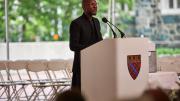Standing before a graduating class of soon-to-be architects and designers and urban planners at the Graduate School of Design’s Class Day, Teju Cole—the Vidal professor of the practice of creative writing—wanted to talk about doors. Real doors, but also symbolic ones. He began with a story from his own childhood in Lagos, Nigeria, about a door his father had brought home from a trip to Brazil, a “honey-colored, luminous, gorgeous” object that was “fit for a cathedral” but had no practical place in the family’s two-bedroom rented flat. For years, said Cole, the unused and unusable door gathered dust in the corner of their home, but his father remained committed to the idea it represented: a house and property of their own. That commitment “stayed with me, not only as an act of faith, but as an instinct for understanding a kind of power of portals.”
Cole is a novelist, essayist, photographer, and curator. His five books include Open City, Blind Spot, and most recently, Human Archipelago, a collaboration with photographer Fazal Sheikh that explores the plight of displaced persons and refugees around the world. Cole’s own photography has been the subject of solo exhibitions, and from 2015 until 2019, he was the photography critic of The New York Times.
In his speech, he wound through the etymology of the word “door”—one of the oldest in human civilization, as ancient as “hand,” or “bread,” or “home”—and its equally ancient architectural history (“a house without a door is either a dungeon or a tomb”). He spoke about doors as a rich, resonant subject for artwork, and explored the symbolic force of the word’s many meanings: passageways, openings, opportunities, the act of crossing over, of overcoming. Finally, his meditation landed on a very different kind of door. A few years ago, he traveled from Lagos across what was once called the Slave Coast of West Africa, to Ouidah, Benin, where a giant bronze and concrete arch, the Door of No Return, memorializes the enslaved who were taken from that place. Cole saw the tree to which people had been chained, the field that was once a holding pen for thousands, the pit where those who rebelled were thrown to their deaths. “This was a journey into traces of human cruelty,” he said.
He looked out at the graduating class. “Design is not an intellectual exercise,” he said. Taken altogether, their work will be influential. “But the question of what kind of influence you will have is up to you. We face challenges, and we need you to be a door for us. We’re living in a time of toxic patriarchy still. We are living in a time of white supremacy still. There are those who agree to build prisons. There are those who agree to build detention camps. Oppression has always had great use for architects and designers and urban planners. Redlining was a technical skill. And everything that betrays our collective humanity depends on people just like you, with skills just like yours.”
He wasn’t finished. “Fascism in guises large and small requires signage and advertising,” Cole said. “It requires vivid design and the architecture of enmity. History assures us that many, many people get swept up in the flood of its seduction.” He paused. “Will you be one of those who refuse to participate? Even when you know that there will be no medals for your refusal? Even when you’re assured that your refusal will only earn you mockery, poverty, or worse?”
A few minutes later, he returned to an idea he’d introduced in the beginning of the speech: how people become doorways for each other, to help others get where they are going. He quoted the author Toni Morrison, who, in a 2003 interview, said, “I tell my students, ‘When you get these jobs that you have been so brilliantly trained for, just remember that your real job is that if you are free, you need to free somebody else. If you have some power, then your job is to empower somebody else. This is not just a grab-bag candy game.’”
“I think about that a lot,” Cole said. He told the graduates-to-be that it is important to take their professional endeavors seriously, to work toward mastery in all their skills. “But expertise is not the destination,” he cautioned. “The destination is freedom. What can we do to free others? Sure, we are experts, but under what ethical pressures does this function? In other words, how do we become a door for others to pass through?” Later, he added a wish for the graduates’ careers. “You will do work that allows you to live with yourself. That’s the bigger dream, putting feeling into form in a way that doesn’t do violence to what is human in you.”
And what about his father’s door? Eight years later, Cole said, his parents—both of whom were in the audience—finally were able to buy a piece of land, on the outskirts of Lagos. They built a house there, and placed the door in it, “like a jewel in a velvet cushion.” Three years after that, Cole left home at 17 to go to college in the United States. And “it was through this doorway, literally, that I stepped—this beautiful, long-nurtured Brazilian door.”









